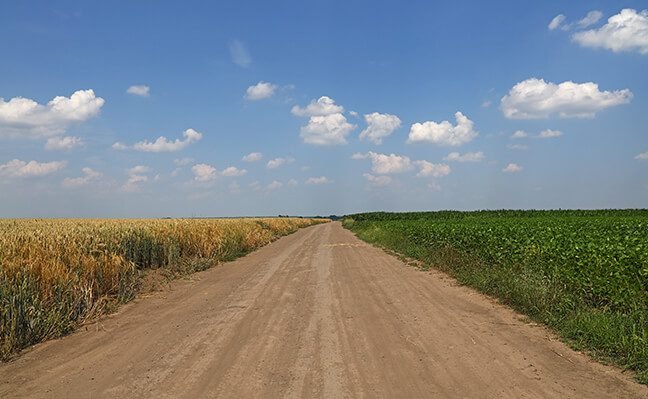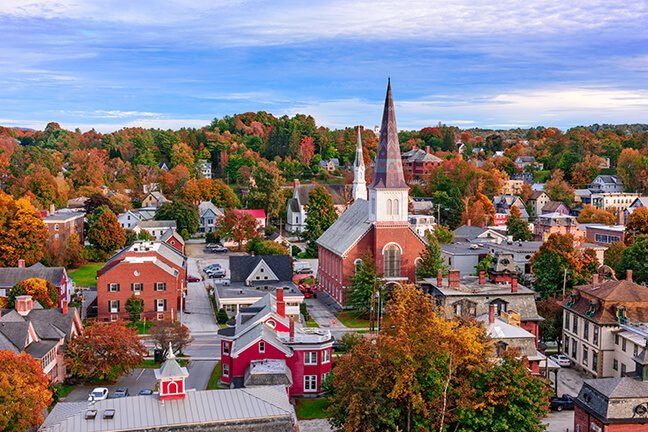If you’re an immigrant relocating to the United States, there’s a good chance you’ll end up moving to a rural area or small town.This article will discuss the many pros and cons of living in these areas. Whether you’re just staying temporarily or planning to reside there for good, it’s important to be prepared for what awaits you.
So without further ado, here are 15 tips for immigrants moving to a rural area or small town in the USA.
What are the Benefits of Living in Rural Areas and Small Towns?
Quiet Open Space
Are you looking to get away from the hustle and bustle of city life? If so, then a rural area or small town is probably right for you. These areas have much quieter open spaces, which can be very relaxing. There are fewer people around so traffic will be less of a headache.
Friendly People and a Strong Sense of Community
In general, people in rural areas and small towns are more friendly and welcoming than those in the cities. Everyone knows each other and looks out for each other. So if you’re looking for a close-knit community, these types of areas are definitely worth considering. More space just means you’ll have to travel a little further to meet your neighbors or pick up grocery.
Lower Cost of Living
One of the biggest advantages of living in rural areas and small towns is the lower cost of living. Rent and groceries tend to be cheaper than in cities. With large retail stores like Walmart and Target now spreading across the country and with Amazon delivery services, access to everyday goods is no longer a big problem.
Slower Pace of Work and Life
The pace of life in rural areas and small towns is usually slower and more relaxed. People don’t tend to be in a hurry all the time. Rural living means no more daily commute or lengthy wait times on the bus or subway to get to work.
Clean Air
Open spaces and less people and industry means cleaner air. If you’re looking to get away from pollution, then rural areas and small towns are definitely worth considering.

What are the Disadvantages of Living in Rural Areas and Small Towns?
Less Cultural Diversity
One of the biggest disadvantages of living in rural areas and small towns is that there are fewer people from different cultures and backgrounds. So if you’re looking for a place with a lot of cultural diversity, these types of areas are probably not right for you.
Restaurants or food from your home country will be harder to find.
Luckily with the expansion of online grocery shopping, you can have that “touch of home” delivered to you. Just be sure to plan your meals a little further in advance.
Isolation
Another downside of living in rural areas and small towns is that they can be quite isolated. There’s often less public transportation and it can be difficult to get around. If you don’t know how to drive, you must learn.
Limited Job Opportunities
One of the biggest disadvantages of living in rural areas and small towns is the limited job opportunities. There are often fewer jobs available, and the jobs that are available tend to be lower paying. So if you’re looking for a place with lots of job opportunities, these types of areas are probably not right for you.
However, in the post-COVID world, many companies have begun to allow employees to work remotely. This provides an opportunity for country living but “big city” salaries.

How to Prepare for Moving to a Rural Area or Small Town
Your move to a rural area or small town from your home country doesn’t have to be a difficult one if you follow the recommendations below.
1. Research the Area or Small Town
First thing first: you need to do your research. Not all rural areas and small towns are the same. Learn as much as you can about the area or small town you’re planning to move to. Read up on its history, culture, and attractions. Talk to people who have lived there or visited there. The more you know, the better prepared you’ll be for your move.
Luckily many of these towns and areas have civic centers or government websites that talk about the area and what services are provided. A Google search on the local schools, and “Things to do in (town or area name)” will provide you with lots of information.
2. Research Housing Options
Before moving, research your housing options. Small towns and rural areas are not going to have a large supply of apartments or housing like you might find in a city. You will want to make sure you have a list of places to live that fit your needs and budget. Try searching for “rental houses” on sites such as:
You’ll be able to review properties and take virtual tours. You will also see local agents in the area. Reach out to them as they may have other options for you that are not in the National databases.

3. How Far Away are Medical Services?
From a primary care physician to specialized treatment and emergency hospital needs, how far away are each of these services? If you are moving from a big city in your home country to a rural area in the U.S., you’ll find that medical services are offered very differently.
In the US we have many “walk-in clinics” and “urgent cares” that can provide routine services. These will be more limited in rural areas. You’ll most likely need to schedule a doctor’s appointment in advance. Make sure you know where the medical facilities are located as well as the closest hospitals. It’s always better to be prepared before an accident or illness occurs.
4. Is there a Reliable Internet Connection in Rural Areas?
A fast and reliable internet connection is important for many people who work from home or need to be connected for school. While most rural areas and small towns have some form of internet, the quality and reliability can vary greatly.
You’ll want to make sure you have a backup plan for internet access in case of outages. This could include a mobile hotspot or satellite internet. You can also look at unlimited data plans from wireless providers.
Be sure to check their coverage area for your home addresses and in nearby towns. If the coverage speeds are ok, this may be a better option if a landline is not available.
You can use your phone or a hotspot box as the router for your home.
5. Prepare for Less Cultural Diversity
As an immigrant to a new country, we all want to look for some connection to our culture. This may be in the food we eat, music we listen to, or even language. In a rural area or small town, this can be more difficult to find.
You’ll want to research if there are any other immigrants from your country living in the area, as well as any cultural clubs or associations. If you’re moving to a smaller town, you may need to drive to a larger city to find the food and other items from your homeland.
At the same time, by living in these small towns you will have more opportunities to interact with friendly locals which will speed up your understanding of local customs and increase your opportunity to practice your English (if you’re not fluent).

6. Once You Arrived: Learning the Local Accent
Even if everyone in the United States speaks English, that doesn’t mean that there won’t be a language barrier. In some rural areas or small towns, the local accent can be very different from what you’re used to.
If you have trouble adjusting to the different accents, try to find an online English tutor that grew up in the area or currently lives there. They will be able to teach you some local phrases and help you adapt to their accent. Most English tutors are taught to use a neutral accent. Make sure your tutor knows you want to learn “local phrases and speaking style”.
You can also look for English classes in the area so you can brush up your skills. If there are no local classes you can find online lessons and tutors. Then go into the community and practice what you’ve learned. You’ll find that small-town residents are very patient and helpful in teaching you when they know you are becoming a local resident.
7. Join Local Community Organizations
A quick way to learn about your new home and make friends is to join a local organization. In small towns, there are usually many clubs and groups to choose from, such as the Rotary Club, Chamber of Commerce, Eagles, Elks, or Moose Lodge.
Most towns also have a YMCA or recreation center where you can take classes or participate in activities. If you’re moving to a rural area, there may be groups for farmers or ranchers that you can join.
This is a great way to meet people with similar interests and learn more about your new community.
8. Volunteer in the Community
A great way to get involved in your new community is to volunteer. There are many organizations that always need help, such as the local food bank, animal shelter, library, or hospital.
You can also volunteer for special events that are held throughout the year. This is a great way to meet new people and make friends. Plus, it’s a great way to give back to the community that has welcomed you.
If you have children in school, there are always opportunities to help in the classroom or with after-school activities. This is a great way to meet other parents and get involved in your child’s education.

9. How to Find a Job in Small Town
Looking for a job in a small town can be difficult if you don’t know where to start. The best place to start is by checking the local town’s government job board. You can also go to city hall or look on the online site for potential opportunities.
10. Online Searches
You can use one of the larger job portals and the filter to your town and the distance from the area to find opportunities. Some of the major sites include:
11. Local Job Fair
Another great way to find a job is to attend local job fairs. This is a great way to meet potential employers and learn about job openings in the area.
12. Reach Out to Local Businesses
You can also check with local businesses to see if they are hiring. Many times, small businesses will post job openings on their website or Facebook page. You can also stop by the business and ask if they are hiring.
13. Temp Agency
Check your area to see if there is a temp agency. This can be a great way to get your foot in the door with local businesses and potentially find a long-term job.

14. Network
Finally, don’t forget to network! Talk to people you have met and let them know you are looking for a job. They may know someone who is hiring or be able to give you some advice on finding a job in the area.
15. Start Your Own Business
If you’re having trouble finding a job, you may want to consider starting your own business. This is a great way to be your own boss and make money.
There are many resources available to help you start your own business such as the Small Business Administration. They offer classes and resources to help you get started.
You may also want to consider starting an online business. This is a great way to reach customers all over the world.
Final Thoughts
Moving to a rural area or small town can be a great experience. There are many benefits to living in a small town such as the close-knit community, beautiful scenery, and low cost of living.
However, there are also some challenges you may face such as the lack of job opportunities and the slow pace of life. But, if you’re prepared for these challenges, you’ll be able to enjoy all that small town living has to offer.

City Life or The Suburbs
Not interested in living a quiet life in a small town or rural area?
Maybe you’re used to a more urban area?
No problem, everyone is different. Learn about city living and suburban life for new immigrants to the U.S with these articles.

